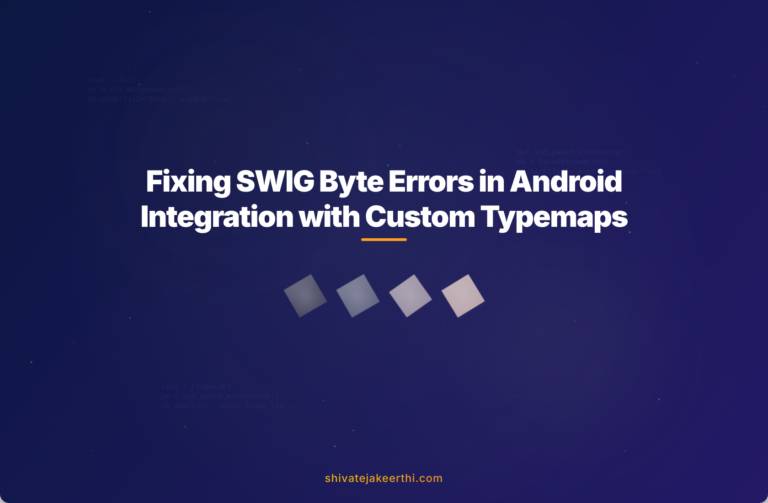Integrating C libraries into Android apps is a smart way to leverage existing high-performance code. But if you’ve done this using SWIG (Simplified Wrapper and Interface Generator), you’ve probably hit a roadblock now and then.
Let’s take a real-world scenario where you integrate a proprietary command protocol library written in C into an Android Java application. Sounds straightforward, right? Unfortunately, things can get tricky, especially if you hit an error like “byte cannot convert to SWIGTYPE_p_uint8_t.”
In this blog, I’ll help you understand exactly why that happens and, most importantly, how you can solve it.
Background & Scenario
Imagine this, you’re tasked with developing an Android app that communicates using a proprietary command protocol library, which happens to be in C. Naturally, you opt for SWIG to bridge this native C code with your Java-based Android application.
However, during the compilation of the SWIG-generated wrapper, you encounter an error:
"error: incompatible types: byte cannot be converted to SWIGTYPE_p_uint8_t"
This error occurs because SWIG doesn’t automatically map certain native C types directly to Java types. Specifically, the ‘uint8_t‘ in C often gets translated to Java’s ‘byte‘ type, but SWIG provides its own temporary placeholder (SWIGTYPE_p_uint8_t) when the type isn’t recognized or mapped explicitly.
Understanding and troubleshooting this issue requires diving into your project structure.
Setting up a Demo Project for Understanding
We built a simplified demonstration project starting from Android Studio’s “Native C++ Project Template” to replicate this SWIG compilation error.
To make SWIG cooperate nicely, there were several tweaks necessary to the default configuration:
- Installing SWIG and adding its executable to the system path.
- Tweaking Android’s default native setup to add SWIG-generated JNI interfaces via CMake.
CMakeLists.txt Configuration for SWIG
Your project’s CMakeLists.txt file determines how native libraries are configured and built. Here’s the key points needed in CMake for SWIG integration:
- Specify SWIG minimum version and dependencies:
cmake_minimum_required(VERSION 3.10)
project(SwigExample)
find_package(SWIG REQUIRED)
include(${SWIG_USE_FILE})
find_package(Java REQUIRED)
find_package(JNI REQUIRED)
include_directories(${JNI_INCLUDE_DIRS})
- Define your SWIG interface file and set your custom Java package:
set(CMAKE_SWIG_OUTDIR ${CMAKE_CURRENT_BINARY_DIR}/generated-swig)
set(CMAKE_LIBRARY_OUTPUT_DIRECTORY ${CMAKE_CURRENT_BINARY_DIR}/libs)
set_source_files_properties(interface.i PROPERTIES CPLUSPLUS OFF)
swig_add_library(swigtest
TYPE SHARED
LANGUAGE java
SOURCES interface.i native-lib.c typemaps.i)
target_include_directories(swigtest PRIVATE ${JNI_INCLUDE_DIRS})
- Ensure you include the native sources correctly (e.g., native-lib.c, native-lib.h, typemaps.i).
Implementing C Code and Structures
Let’s say your C code includes a simple struct and a processing function for clarity:
native-lib.h:
#ifndef NATIVE_LIB_H
#define NATIVE_LIB_H
#include <stdint.h>
typedef struct {
uint8_t data;
} _foo;
void process(_foo *packet);
#endif
Then you implement the process function in native-lib.c:
#include "native-lib.h"
#include <stdio.h>
void process(_foo *packet) {
printf("Data from packet: %d\n", packet->data);
}
Configuring SWIG Interface
Your SWIG file (interface.i) bridges C header & implementation files to Java-generated wrapper code:
%module swigtest
%include "typemaps.i"
%include "native-lib.h"
Now comes the tricky part: handling mismatched data types properly.
Why SWIGTYPE_p_uint8_t Appears—The Typemap Issue
The primary reason SWIG throws the error “byte cannot convert to SWIGTYPE_p_uint8_t” is that SWIG doesn’t recognize or know how to automatically translate the ‘uint8_t‘ C structure field directly into a straightforward Java ‘byte‘ type. Harmfully, SWIG defaults to a placeholder type (SWIGTYPE_p_uint8_t), indicating you need to write custom typemaps.
Creating Custom Typemaps to Solve the Issue
To let SWIG know exactly how to move bytes between Java and C, you must define custom typemaps explicitly within your ‘typemaps.i‘ file. An example configuration looks like this:
%include "stdint.i"
%typemap(jtype) uint8_t "short"
%typemap(jni) uint8_t "jshort"
%typemap(jstype) uint8_t "short"
%typemap(in) uint8_t {
$1 = (uint8_t) $input;
}
%typemap(out) uint8_t {
$result = (jshort) $1;
}
Notice we use “short” instead of “byte” in Java to accommodate unsigned C bytes (as Java bytes are signed values from -128 to 127). Using Java short types ensures positive values correctly map to C uint8_t (which ranges from 0-255).
SWIG now knows precisely to map your C structure’s ‘uint8_t‘ directly as ‘short‘ into your Java classes. This effectively resolves the original impossible typemap issue.
Integrating SWIG-generated Library into Android
Once SWIG successfully generates the Java wrappers, integrate those in your app’s ‘MainActivity.kt‘:
- Load native libraries through System.loadLibrary:
companion object {
init {
System.loadLibrary("swigtest")
}
}
- Create instances and use your native structs and methods now available via SWIG’s Java bindings.
Troubleshooting Strategies You Should Try
If the issue persists or similar SWIG errors pop-up in future:
- Always double-check your SWIG typemaps for accuracy and completeness.
- Clearly verify data types portability between Java/C—Remember Java doesn’t have unsigned types.
- Consult active communities at sites like Stack Overflow or official SWIG documentation.
Recommendations for Future Projects
- Proactively map unconventional struct types explicitly when using SWIG in Android.
- Consider encapsulating native structures using Java classes to smoothly handle conversion, especially when unsigned C types are involved.
When done right, SWIG proves incredibly powerful at seamlessly integrating native C libraries into Android apps. Understanding custom typemaps is essential and helps prevent common compilation pitfalls like the infamous ‘SWIGTYPE_p_uint8_t‘.
Hopefully, you’re now better prepared to handle SWIG integration hiccups in your Android app journey.
Have you encountered similar SWIG conversion issues before? Share your experience or solutions below—let’s troubleshoot and learn together!



0 Comments